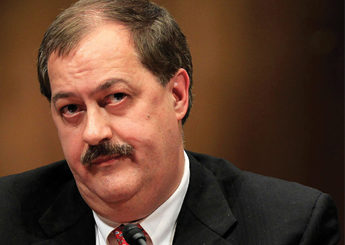Former mine CEO Blankenship asks Trump to reject calls for harsher punishments for safety violators

Donald Blankenship; photo: Alex Wong/Getty Images News/Thinkstock
Washington – Days after his May 10 release from federal prison after serving a one-year sentence for violating mine safety laws, former Massey Energy Co. CEO Don Blankenship sent a letter to President Donald Trump asking him not to consider legislation that would strengthen punishments for mine supervisors who knowingly flout safety rules.
“Coal supervisors are not criminals, and the laws they work under today are already frightening enough for them,” Blankenship wrote. “More onerous criminal laws will not improve mine safety. Conversely, mine safety will be greatly improved if legislation emphasizing technology and the division of [the Mine Safety and Health Administration] is passed.”
On April 6, 2016, the U.S. Attorney’s Office in West Virginia issued a one-year sentence, the maximum possible jail term for Blankenship’s misdemeanor conviction of conspiring to violate mine safety regulations. Blankenship, 67, was convicted of willfully violating safety standards leading up to a methane explosion that killed 29 workers in April 2010 at the Upper Big Branch mine in West Virginia.
Blankenship’s letter came on the heels of a statement from Rep. Bobby Scott (D-VA), ranking member of the House Education and the Workforce Committee, advocating harsher criminal penalties for violating federal mine safety laws.
Scott is calling for making future willful mine safety violations felonies and imposing a maximum prison sentence of five years – provisions of the Robert C. Byrd Mine Safety Protection Act, which Scott reintroduced in the House on April 5.
“The release of the former Massey CEO who served the maximum possible sentence of only one year for willfully violating mine safety standards that led to the Upper Big Branch Mine disaster should serve as a reminder that the criminal provisions in the Federal Mine Safety and Health Act of 1977 remain woefully inadequate,” Scott said in the statement. “The maximum penalty for the willful violation of a mandatory health and safety standard is a mere misdemeanor – rather than a felony – regardless of the number of miners killed because of criminally reckless conduct.”
Although Blankenship was acquitted of separate conspiracy charges that could have carried up to 30 years of imprisonment, his misdemeanor conviction and sentencing marked a rare occurrence in which an employer was found criminally responsible for safety violations. According to news reports, Blankenship fulfilled most of his sentence at a California correctional institute before being transferred to an Arizona halfway house. He still must serve one year of supervised release.
In his letter, Blankenship further requested help to “expose the truth of what happened at the Upper Big Branch (UBB) coal mine,” contending that the findings were not accurate.
“What happened at UBB is simple,” Blankenship wrote. “MSHA cut the miners (sic) airflow in half, natural gas inundated the mine just days later, and sparks from cutting sandstone rock ignited the natural gas. The explosion was not as MSHA claims, a coal dust explosion.”
Post a comment to this article
Safety+Health welcomes comments that promote respectful dialogue. Please stay on topic. Comments that contain personal attacks, profanity or abusive language – or those aggressively promoting products or services – will be removed. We reserve the right to determine which comments violate our comment policy. (Anonymous comments are welcome; merely skip the “name” field in the comment box. An email address is required but will not be included with your comment.)

